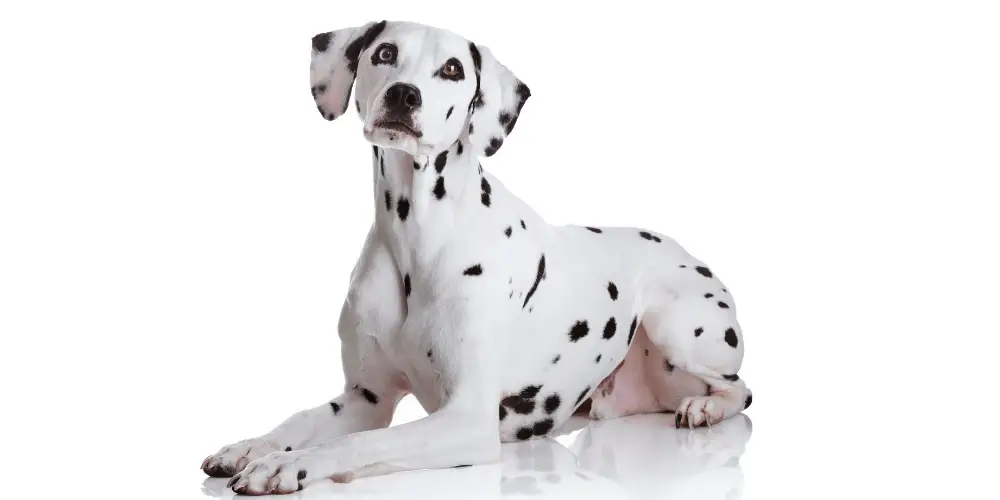Dalmatians, the most gracious and unique dog breed of them all, but where do these dogs come from, and what are they all about?
While there seems to be a lot of confusion regarding the history, there is a lot to talk about the modern breed – they really are that special. It’s hard to pinpoint the exact origin of the breed. There are many theories and legends about just how far back the lineage really goes.
Dalmatian History
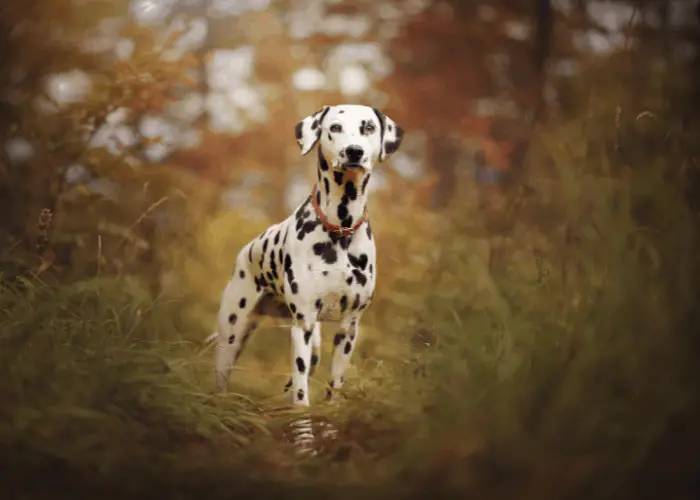
Throughout its history, Dalmatians filled many necessary roles for us. Most of those roles revolved around protection of some sort.
Whether they fought alongside in war, guarded their owners against unwanted visitors, or protected horse carriages along with their trips, the instinct to serve and protect goes back far.
They are tough and loyal dogs that are all about taking care of business, although they still love to goof off and have fun from time to time.
Unfortunately, their history has largely been forgotten and overlooked in modern times – mainly due to that one Disney animated film centered around them. In that film, they were portrayed as friendly, lovable lapdogs.
As a result, many people who fell in love with the beauty of the breed weren’t aware of all their needs, resulting in neglect. And the sudden large popularity didn’t help either.
The whole Dalmatian breed suffered as a whole. The large demand for Dalmatians opened the market for backyard breeds and puppy mills to push out as many puppies as possible, regardless of health, temperament, or their dogs’ well-being.
The combination of poorly bred dogs and owners with unrealistic expectations gave Dalmatians a very bad rep as aggressive/unstable dogs – which isn’t true.
Luckily the “fad” has died down, and the popularity of the breed fell dramatically since then, which meant less poorly bred dogs and, hopefully, more educated owners. Even though their popularity might be falling, its effects will hopefully restore the breed’s reputation.
Physical Characteristics
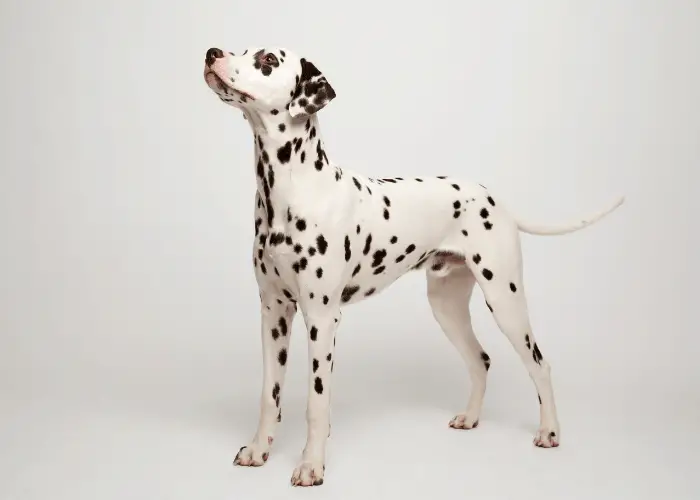
- Lifespan: 10-15 years
- Size: Medium/Stocky Built
- Height: 18-25 inches (45-65 cm.)
- Weight: 50-55 lbs (22-25kg)
- Color: White, White with Black Spots, White with Brown Spots
Personality And Temperament

There are vast differences from dog to dog, even if they are of the same breed. However, there are a few things Dalmatians tend to have in common.
The personality traits that I’m about to list are just general traits that Dalmatians tend to have. Each dog will be different depending on their parents and upbringing, but the following list should give you a better idea of what to expect:
- Very Active – this breed comes from a lineage of very active dogs who absolutely need to run, play and explore to stay mentally sharp. If you’re looking for a dog that will be happy to run right next to you on your morning jogs and has plenty of energy to play with your kids all day right after, these dogs are for you. They are not the type of dogs that want to sleep on the couch all day.
- Intelligent – The thing about Dalmatians is that they are extremely intelligent and have a mind of their own. So solid fundamental obedience training is a must with these dogs. They should be given consistent and firm boundaries as puppies, with a lot of training, unless you want to end up with a very disobedient adult dog. They will test you if they think you’re unfair or they don’t trust you. If your dog sees you as a good leader and has full trust in you, he will always listen and trust your actions. With the right leadership, you can win their trust and have an amazing loyal pet.
- Very Social – Well-bred and well-tempered Dalmatians will always want to make new friends and meet new people. The key, of course, is to get them socialized early on while they are still puppies.
- Clean Dogs – Dalmatians are beautiful dogs, and part of that reason is that they like to keep themselves clean – which means you will have less grooming to keep up with.
- Protective – Through history, these dogs had built up an instinct to protect and guard. As a result, they can make wonderful guard dogs, but it will take them to understand what is expected of them properly.
- They get bored easily. Dalmatians don’t like repeating the same tasks over and over and get bored pretty easily. They hate sitting home all alone with nothing to do. These dogs are always looking for something to stimulate them physically or mentally.
- Dalmatian dog breeds are social dogs. Dalmatians love every moment of attention that they can get. They love being the center of the room when friends and family stop by for a visit. Going out on walks and meeting new people is another activity that these dogs enjoy.
- They are active dogs. Please give them a large area and something to do, and these dogs will stay outside happy all day. They can never get enough physical activity, and once they reach adulthood, they can run outside practically all day.
- They are good watchdogs. The thing to note about this breed is that they can get very protective of their owners and their human family. If they sense even the slightest bit of threat from a stranger, they will let them know by either barking or growling to back off.
- Dalmatians are known as a very stubborn breed. It’s true. Dalmatians are known to be a little more stubborn than other dog breeds. However, if you know what you’re doing and how to maintain the role of the pack leader, then this is not really an issue.
Health Issues
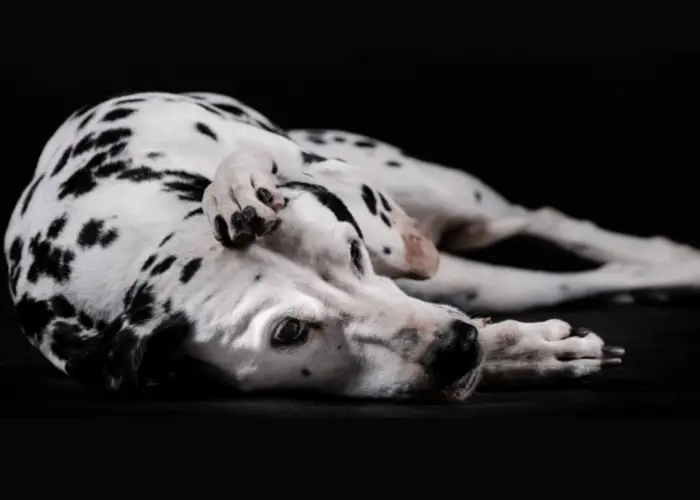
When it comes to health, besides a few genetic possible problems, Dalmatians are relatively healthy. Nearly all purebred dogs have some breed-specific issues, and Dalmatians are no different. The biggest and most common health concerns with these dogs are deafness and bladder stones.
- Deafness – Nearly 30% of Dalmatians have some hearing disability – whether it’s just one ear or both. Most breeders have their puppies tested for hearing problems. The test is called the BAER test, so make sure you ask for results before you get your puppy.
- Urinary Stones – Dalmatians are at a higher risk of developing bladder stones due to high levels of uric acid in their blood. Although it’s a genetic issue, you can reduce the chances of having proper diet and hydration problems.
Related Topic: Common Dalmatian Health Problems
Training Requirements
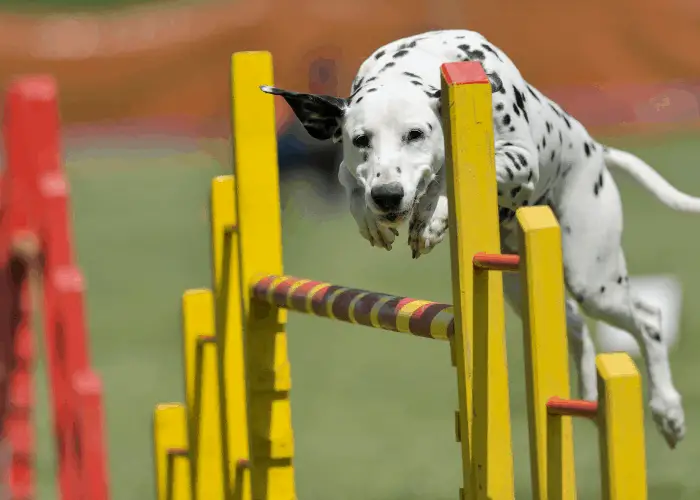
If you want to own a Dalmatian, you will have to do some obedience training. Yes, they are very smart dogs – but that intelligence can actually work against you.
Since they are so clever, they will have moments of stubbornness to decide they know better than you. Without proper training, those moments will be happening almost all the time.
When I say “proper training,” I’m not talking about the junk methods that focus on being the “alpha.”
Most of those training techniques involve yelling, shouting, or putting yourself on the same level as the dog (I kid you not, I’ve seen someone say that you need to bite your dog’s ear to display dominance).
None of that will work with Dalmatians. They will see through it and assume you’re crazy.
The correct approach to training Dalmatians involves positive reinforcement, consistency, and very clear rules. It’s going to take some time and effort, so be prepared for that.
Usually, I recommend at least 10 minutes a day of obedience training. It might not seem like much, but it’s enough if done daily with consistency. So if you think you have ten minutes plus the initial time to do some studying, you should do fine.
Related Topic: How to Train a Dalmatian
Who Are They For?

Thinking of getting a Dalmatian? Well, first you need to decide if they are even right of you. As wonderful as this breed is, it is definitely not for everyone. So then who exactly are they for then?
First and most importantly, they are for active people and want a dog that can keep up. If you have kids who love to play outside, or you yourself enjoy going for jogs or hiking, Dalmatians can make really good companions.
These dogs are full of energy, and if you don’t help them release it, they will find ways to entertain themselves – and it will probably be at your expense.
Their instincts that they have to guard and protect can come in handy for people with kids. They are not the most intimidating or biggest dogs, but they sure can scare someone off.
Since Dalmatians are pretty darn clever, they are not recommended for people who don’t want to bother with training. Again, they are not little lapdogs who will sit quietly and do as they are told. Instead, they will look for good leadership and will listen when approached correctly.
Final Thoughts:

Dalmatians can make wonderful family pets as long as their needs are met. They require an active lifestyle along with proper training.
Owning a happy, healthy, and well-behaved Dalmatian will take some effort, but the loyalty and companionship you get will be rewarding and worth the effort.

